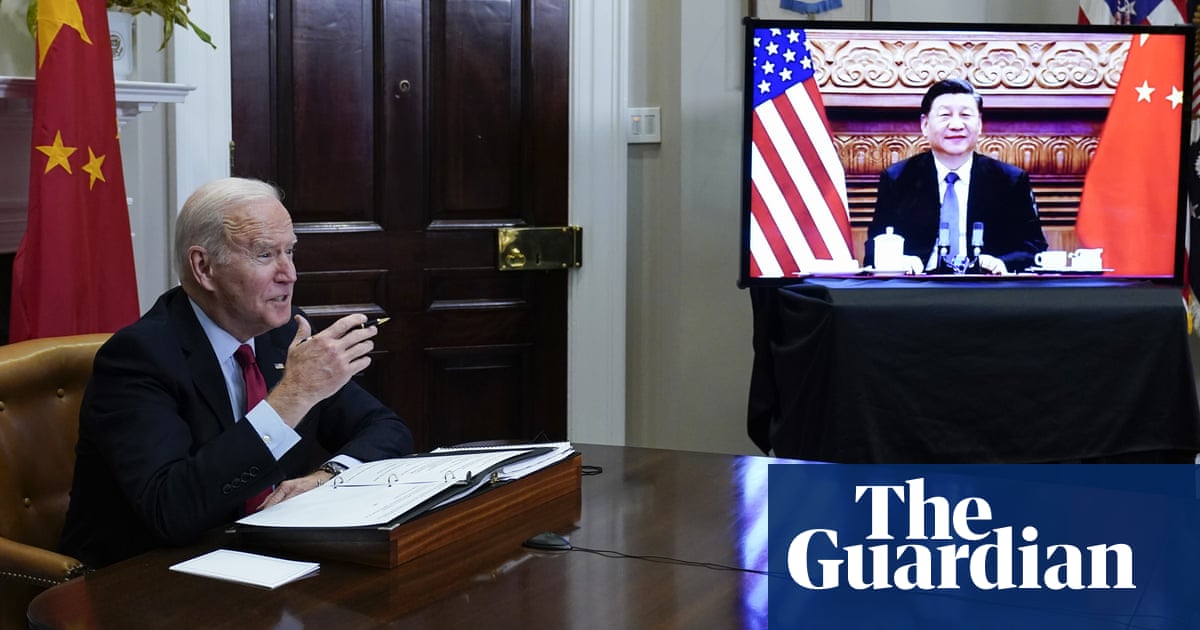Joe Biden again says US forces would defend Taiwan from Chinese attack
Joe Biden has again said US forces would defend Taiwan in the event of a Chinese invasion, in his most explicit statement so far on the issue.
Asked in a CBS 60 Minutes interview broadcast on Sunday whether US forces would defend the self-ruled island claimed by China, he replied: “Yes, if in fact there was an unprecedented attack.”
Asked to clarify if he meant that unlike in Ukraine, US forces – American men and women – would defend Taiwan in the event of a Chinese invasion, Biden said: “Yes.”
A White House spokesperson said US policy towards Taiwan had not changed, after being asked about the president’s comment.
The Chinese foreign ministry said China had lodged “stern representations” with the US. “The US remarks … severely violate the important commitment the US made not to support Taiwan independence, and send a seriously erroneous signal to Taiwanese separatist independence forces,” foreign ministry spokesperson Mao Ning said at a regular press briefing.
“We are willing to make the biggest sincere efforts to strive for the prospect of peaceful reunification,” Mao said. “At the same time, we will never tolerate any activities aimed at splitting the country, and reserve the choice to take all necessary measures.”
In a statement Taiwan’s foreign ministry expressed “sincere gratitude” to Biden for “affirming the US government’s rock-solid promise of security to Taiwan”. Taiwan would “resist authoritarian expansion and aggression” and “deepen the close security partnership” with Washington and other governments “with similar thinking” to protect regional stability, the statement said.
The US president’s remarks throw into question Washington’s longstanding position of “strategic ambiguity” on Taiwan.
The US is obliged by federal law to ensure that Taiwan has the means to defend itself but the law does not state whether American forces would be sent. The US has no formal relations with the democratically run island but maintains informal diplomatic ties.
A White House spokesperson said after the 60 Minutes interview: “The president has said this before, including in Tokyo earlier this year. He also made clear then that our Taiwan policy hasn’t changed. That remains true.”
The CBS interview with Biden was conducted last week. The president is in Britain for Queen Elizabeth II’s funeral on Monday.
In May, Biden was asked if he was willing to get involved militarily to defend Taiwan and replied: “Yes … That’s the commitment we made.”
In the 60 Minutes interview, Biden reiterated the US did not support Taiwanese independence and remained committed to a “One China” policy in which Washington officially recognises Beijing, not Taipei.
Tensions over the Taiwan strait have been again increasing, after a controversial visit to Taiwan by the US House speaker, Nancy Pelosi, in August. That visit prompted China to conduct its largest-ever military exercises around Taiwan.
The Chinese president, Xi Jinping, has vowed to “reunite” the democratically governed Taiwan and, like his predecessors, he has not ruled out the use of force as a last resort.
In a phone call with Biden in July, Xi warned against “playing with fire” over Taiwan, saying “those who play with fire will perish by it”.
Asked in October last year if the US would come to the defence of Taiwan, Biden said: “Yes, we have a commitment to do that.” The US is required by law to provide Taiwan with the means to defend itself.
At that time, a White House spokesperson said Biden was not announcing any change in US policy and some experts referred to the comment as a “gaffe”.
Bonnie Glaser, an Asia director at the German Marshall Fund of the United States, said if Biden made such pledges he needed to ensure he could back them up.
“If President Biden plans to defend Taiwan, then he should make sure the US military has the capability to do so,” she said. “Rhetorical support that isn’t backed up by real capabilities is unlikely to strengthen deterrence.”
Biden’s Asia policy coordinator, Kurt Campbell, has previously rejected any move towards “strategic clarity” over Taiwan, saying there were significant downsides to that approach.
Reuters and Associated Press contributed to this report













